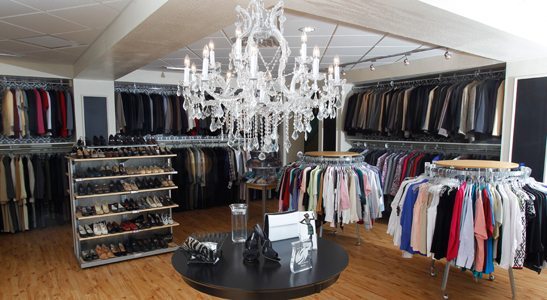With an open, vibrant space, the Dress for Success boutique in Phoenix doesn’t look like a typical second-hand clothing store.
And it isn’t.
First launched in 1996, Dress for Success now has 115 affiliates all over the world, providing professional attire to economically disadvantaged women. In addition, Dress for Success continues to work with these women even after they have landed a job.
Founder and Executive Director of the Phoenix affiliation, Lisa Doromal, opened the store in 2009 with hopes of engaging her community, reflecting her stylistic talents and continuing to be a mother to her kids with the flexibility it offers.
“Luckily for me, there was not an affiliate in the Phoenix area,” Doromal says. She filled out an online application, prepared a formal business plan, and said to herself, “I’m going to go for it. This is something that is needed in the community.”
The company receives garment donations from women in the community. However, Doromal says the organization often has to purchase plus-size clothing. Hardly any plus-sized suits are donated, but clients who need them take up about 72 percent of her client base. Still, Doromal insists, “Whether you are a size 0 or 32, we are going to have clothes for an interview.”
Clothes that are deemed inappropriate for clients to wear are picked up weekly by the Society of St. Vincent de Paul, a non-profit that benefits the poor.
Funding for purchases comes from a “diverse stream of income sources,” Doromal says. The organization utilizes fundraising opportunities, grants, private donations and agencies that provide supportive services.
Doromal credits her partnership with Chicanos Por La Causa (CPLC), an organization aimed at integrating human and economic development, for the success of the boutique. CPLC provided the initial 500-square-foot space for the store. Since then, the boutique has moved to a larger, 3,200-square-foot boutique.
In addition to providing suits, Dress for Success has created several job-readiness programs that extend past the job interview phase.
One of the programs, the Going Places Network, lasts eight weeks. During this time, women meet weekly and “learn how to navigate the Internet network to apply for jobs, presentation skills, mock interviews [and] really honing in on why they are not landing employment,” Doromal adds. Approximately 70 to 80 percent of women are employed by the time the class ends.
Once a woman obtains a job, she can go back to the boutique and get up to a week’s worth of clothing. They also receive an invitation to join the Professional Women’s Group (PWG), which allows women who have gone through the program to interact with one other. PWG covers a range of topics from financial literacy to balancing life and work.
“It’s more than just a suit,” Doromal says. “The suit is just the beginning.”
The boutique is primarily run by volunteers. Through a partnership with the Senior Community Service Employment Program, seniors who have been out of the workforce are given a stipend for their time.
“We treasure our volunteers,” Doromal says.
While Doromal does not anticipate any more locations will open up in the Phoenix area, she does have high hopes for her boutique.
“As long as the client wants to be involved with Dress for Success, we are there for her throughout her professional development,” she says. “[We are] trying to break the cycle of poverty.”
For more information about Dress for Success, visit dressforsuccess.org.
1024 E. Buckeye Rd., #165
(602) 489-7397




